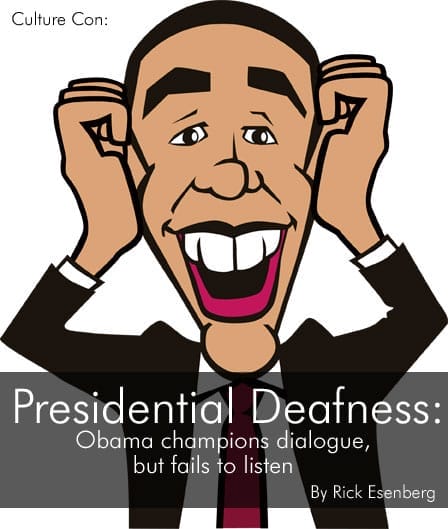Recently, a liberal friend suggested that I read President Obama’s “nuanced and thoughtful defense of government” at the University of Michigan’s recent commencement ceremony. I bit and found it instructive, although not in the way in which my friend intended.
The president’s point of departure is a question posed to him by a kindergartener in Virginia: “Are people being nice?”
No, the president responded, they most certainly are not. While allowing that politics has never been a beanbag, he reprises his earlier observations about why the benighted “cling to God and guns.” People (by which he means opponents of his administration’s policies) get “riled up” because of “change” apparently including the need to “live and work with more people who don’t look like you or think like you or come from where you do.”
It is, for the president, so sad. But the president suggests two ways in which our political discourse might improve.
The first — and presumably most important — is to appreciate what government can do for us. We ought not to be overly attached to the conception of government set forth in our founding documents. American democracy has thrived, in his view, because government has helped us adapt to changing times.
While nodding in the direction of a “limited” state, the president tells us that sine qua non of improved political discourse is to know that the “government is us.” It is “we, the People.”
Citing Theodore Roosevelt, he observes that the purpose of the government is as broad as “the general welfare” of the people. He calls on us to stop debating about whether we should have “big government” or “small government.”
That debate, he implies, is so 1789. We should limit ourselves to a discussion of how government can be “smarter and better.” We should, like the characters in Dr. Strangelove, learn to stop worrying and love the Leviathan.
There is much to say about this. We do elect those who make the laws. In that sense, government is, at least, a plurality of “us.” But modern public choice theorists — and James Madison before them — have warned of the ways in which political processes tend to be hijacked by the especially interested. Friedrich Hayek demonstrated that no single entity can “know enough” to order society.
Even the president acknowledges that skepticism of government is in our national DNA, although he seems to regard this as an increasingly unfortunate residue of our national evolution.
Thus, we have traditionally carved out areas of individual liberty and placed structural limitations on the exercise of government power. Beyond such constitutional limitations, much of the opposition to the Obama agenda reflects the fact that many of “us” are not happy with what “we, the government” is up to.
We can all agree with the president’s observation that not all government is “inherently bad.” But in rejecting, as he is so fond of saying, the false choice between no government and limitless government, he misses the real choice. He quotes Abraham Lincoln’s observation that “the role of government is to do for the people what they cannot do better for themselves.”
The “change” that has so upset the public — what has created, in Michael Tomasky’s words, the first “right-wing street-protest movement” in our history — is the president’s rather capacious view of what government can do better than the people themselves.
It is a reaction to an unprecedented peacetime increase in the size of the federal budget, state ownership of iconic American corporations, and substantial federalization of the provision of health care. It is collective disgust at a stimulus package that was turned into a riot of pent-up demand for Democratic Party gewgaws and indulgences without evident economic impact.
This is the debate we are having. It is very much about “big government” and “small government.” While the president says that this debate “doesn’t really fit the times in which we live,” many of “us” do not agree.
Even the president’s humor reflects an inability — or unwillingness — to see that the issue is not simply whether government is bad, but whether government ought to be doing what he wants it to do.
He is amused by a sign that said “Keep Your Government Hands Out of My Medicare!” For him this is irrational. It is essentially saying “Keep Government Out of My Government-Run Health Care Plan.”
So it does. But it says something else as well. The Obama health plan proposes substantially increased government involvement in managing the standards of care for Medicare patients.
It is one thing to say that government — which is very good at transferring money from one pocket to another — ought to help senior citizens pay for their health care. It is quite another to believe that the federal government can “bend the cost curve” by attempting to determine — for everyone and everywhere — what forms of care are cost effective.
That was a clumsy sign (we can assume its author did not make the Harvard Law Review), but maybe a more nuanced message than the president is willing to allow.
In his University of Michigan address, he went on to suggest that we listen to the other side and that we participate in civic affairs. Good advice — for both inside and outside the Beltway.
Richard Esenberg, a visiting professor of law at Marquette University, blogs at Shark and Shepherd.





